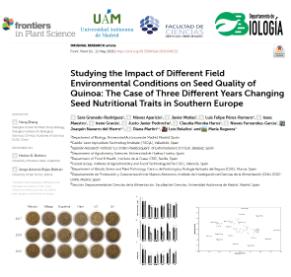Sara Granado-Rodríguez, Nieves Aparicio, Javier Matías, Luis Felipe Pérez-Romero, Isaac Maestro-Gaitán, Irene Gracés, Justo Javier Pedroche, Claudia Monika Haros, Nieves Fernandez-Garcia, Joaquín Navarro del Hierro, Diana Martin, Luis Bolaños and María Reguera

Chenopodium quinoa Willd (quinoa) has acquired an increased agronomical and nutritional relevance due to the capacity of adaptation to different environments and the exceptional nutritional properties of their seeds. These include high mineral and protein contents, a balanced amino acid composition, an elevated antioxidant capacity related to the high phenol content, and the absence of gluten. Although it is known that these properties can be determined by the environment, limited efforts have been made to determine the exact changes occurring at a nutritional level under changing environmental conditions in this crop. To shed light on this, this study aimed at characterizing variations in nutritional-related parameters associated with the year of cultivation and different genotypes. Various nutritional and physiological traits were analyzed in seeds of different quinoa cultivars grown in the field during three consecutive years. We found differences among cultivars for most of the nutritional parameters analyzed. It was observed that the year of cultivation was a determinant factor in every parameter studied, being 2018 the year with lower yields, germination rates, and antioxidant capacity, but higher seed weights and seed protein contents. Overall, this work will greatly contribute to increase our knowledge of the impact of the environment and genotype on the nutritional properties of quinoa seeds, especially in areas that share climatic conditions to Southern Europe.
Enlace a la publicación:
https://www.frontiersin.org/articles/10.3389/fpls.2021.649132/full
Universidad Autónoma de Madrid © 2008 · Ciudad Universitaria de Cantoblanco · 28049 Madrid · Información y Conserjería: 91 497 43 31 E-mail: informacion.ciencias@uam.es Gestión de estudiantes de Grado y Posgrado: 91 497 8264 / 4329 / 4353 / 4349 / 6879 / 8362 E-mail: administracion.ciencias@uam.es